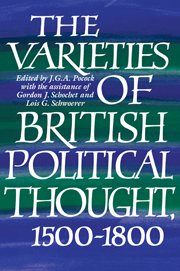Book contents
3 - Kingship, counsel and law in early Stuart Britain
Published online by Cambridge University Press: 04 August 2010
Summary
When Queen Elizabeth I died on 24 March 1603, her secretary of state, Sir Robert Cecil, devised a makeshift great council to proclaim James VI of Scotland King of England. Made up of the now defunct Elizabethan privy council and three noblemen on hand in London, this unlikely body issued the first political text of the new reign. Claiming to speak in the name of the lords temporal and spiritual, the privy councillors, the principal gentlemen of the kingdom, the lord mayor, aldermen and citizens of London, and the commons of the realm, the proclamation declared that James ‘by law, lineal succession, and undoubted right is now become the only sovereign lord and king of these imperial crowns’.
Cecil drafted the proclamation of the first foreign monarch since William the Conqueror before the queen's death and, in secret correspondence with King James, secured approval ‘for musicke that soneth so sueitely’ before it was issued. The prudence of crafting such a text was made plain by the actions of Henry Percy, the earl of Northumberland, who, along with Lord Cobham and Lord Thomas Howard, was asked to take part in privy council deliberations. While Northumberland had agreed to support the Scottish king's title, he appeared with a retinue of 100 men, challenged the privy councillors whose authority had lapsed with the queen's death and asserted the privileges of the old nobility. Cecil plastered over the crack in authority and soothed noble sensibilities by casting James’ accession in the language of legitimacy and history.
- Type
- Chapter
- Information
- The Varieties of British Political Thought, 1500–1800 , pp. 80 - 116Publisher: Cambridge University PressPrint publication year: 1994
- 3
- Cited by



